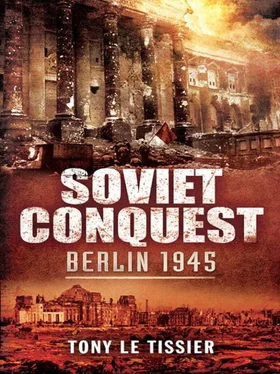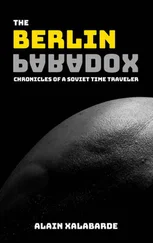‘Now we want to shell the opposite bank.’ he went on. ‘The Fascists over there are unbelievably stubborn, firing with everything they have got. One can hardly lift one’s nose, those devils are so persistent – presumably SS.’
Dremov went to the field telephone and exchanged a few words with a gunner. Shortly afterwards the explosions increased. I went up to one of the cellar windows. On the opposite bank walls were collapsing in clouds of dust. There were fires everywhere and a thick cloud of smoke was climbing into the sky. The explosions left Dremov unmoved. He displayed no feelings but fought soberly and without risks. For him the war was an everyday matter and even the unbelievable performance of his Guardsmen he reported as if it was the most normal thing in the world.
Covered in dust and breathless, a lieutenant burst into the cellar. Uncertain as to whom he should report, he looked from Dremov to me.
‘Comrade Commander-in-Chief,’ he said finally, ‘allow me…?’
‘OK. Go on.’
‘The 19th Mechanised Guards Brigade has forced the Spree.’
Dremov and I looked at each other.
‘Where and at what point?’ I asked.
‘Over the railway bridge a bit north of Adlershof.’
That was good news. I immediately ordered part of the corps to set off for the railway bridge, the remainder to cross by the bridge that the sappers had built. In this way almost all the units of the 1st Guards Tank Army could cross the Spree and reach the Schöneweide–Adlershof area.
‘The bridge will be ready in two or three hours and we can get over,’ assured Dremov.
During the night of the 24th April the 1st Guards Tank and 8th Guards Armies crossed the Spree, reached the Adlershof–Bohnsdorf area and occupied favourable positions for their further attack on the city centre from the southeast. Then we could make contact with the 1st Ukrainian Front’s 3rd Guards Tank Army.
So began the street fighting in Berlin. As mentioned, we had previously attacked in Chuikov’s army’s sector. He had been put in overall charge by Zhukov. As the situation within the city was now different, I asked the Marshal to allocate the 1st Guards Tank Army its own line of attack. Zhukov agreed, but ordered that I hand over the 64th Independent Guards Tank Brigade and the heavy self-propelled artillery to the 8th Guards Army. They remained with the 8th Guards Army until the capitulation of Berlin.
Our attack axis led to Wilhelmstrasse, running parallel to the Tiergarten, not far from the Reichs Chancellery and the Reichstag.
A great obstacle for us were the Panzerfaust men shooting our tanks into flames from their secure hiding places in the sewers and cellars. But the Fascists had not reckoned on these weapons being turned against their originators. During the East Pomeranian operation we had captured 4,500 Panzerfausts , of which about 1,500 had been used on exercise in the preparation for Operation Berlin. The troops learned how to use them in assault teams. We had kept back the remaining 3,000 Panzerfausts for the fighting in Berlin. Now we put these weapons to use successfully in the streets of Berlin. While machine-pistol soldiers could not be smoked out of buildings themselves, the Red Army soldiers worked on the enemy with their Panzerfausts and set the buildings on fire with several shots. Then our guardsmen attacked.
The majority of the important enemy strongpoints were found in big, old buildings whose masonry withstood the tank guns and artillery. When I asked Marshal Zhukov for stronger artillery to deal with these apparently indestructible buildings, he sent me a detachment of 305 millimetre guns. In former times these were known as the 12-inch siege artillery.
When these vast guns went into action the situation improved immediately. One or two 305 millimetre shells were sufficient to destroy an old building and bury the occupants under the rubble.
Berlin was bitterly defended. Every building received us with a hail of fire. Not only the tank-men and the infantry had it difficult, but also the staff officers in their command posts, while the corps and brigade commanders following their troops on foot were attacked time and time again. Again and again Fascists appeared out of side streets, even in apparently cleared streets, armed with submachine-guns and Panzerfausts . Quite often they came under the fire of German artillery or were attacked from the air.
On the 23rd April I received the order from Marshal Zhukov to form a special team for the taking of the Adlershof and Tempelhof airfields. As our reconnaissance had reported, the private aircraft of the Fascist high command and the Nazi party, including also Hitler’s aircraft, were located here ready for flight. To take Adlershof did not appear too difficult, as it was about 4 kilometres from the front line on our line of attack. It was more difficult to work our way forward to Tempelhof airfield as it was practically in the centre of the city, only a few kilometres from the Reichs Chancellery.
Dremov, whom I consulted, suggested I delegate Major Grafov’s independent reconnaissance battalion to take Adlershof. The battalion commander had recently distinguished himself in the fighting at Erkner and had been recommended for decoration as a Hero of the Soviet Union. I knew the major as a bold soldier and approved Dremov’s suggestion.
The most difficult part of the task, the breakthrough to Tempelhof and the conquest of the airfield, was voluntarily taken over by the 23-year-old major and battalion commander V.A. Zhukov, a veteran of the 1st Guards Tank Brigade, who had repeatedly participated in reconnaissance raids and proved himself a resourceful commander. The reconnaissance teams would destroy aircraft found on the ground and hold the position until the main forces arrived. We reckoned that in the confusion of battle and under cover of darkness the tank soldiers and riflemen would be able to get there unnoticed, at least for part of the way. The scouts then studied the city map.
At about 0100 hours our sappers, protected by heavy artillery fire, erected a crossing point over the Spree. The first to cross was Grafov’s battalion. An hour later the scouts reached their goal safe and sound, surprised Adlershof airfield and destroyed seventy aircraft. When the battalion then came under enemy fire and was engaged by superior forces, Temnik’s and Anfimov’s brigades came to their help.
The situation was more difficult for Major Zhukov. He led his men to the Teltow Canal, crossed it fighting and reached the airfield from the southern side. Meanwhile Grafov had also got close to the airfield. Once both battalions had united on the airfield, the enemy had also become aware and sent tanks and motorised infantry against them. For two whole days the reconnaissance teams repelled numerous attacks by overwhelming forces on the airfield until our troops came to their rescue. Zhukov lost his life in this action.
We tore the enemy out of one suburb after another. At 1030 hours on the 24th April the following radio message was received from the commander of the motorcycle regiment, Mussatov: ‘Have reached the suburb of Teltow. Have met Rybalko’s tank troops. Mussatov.’
I hastened to pass on this pleasing news to the Front commander-in-chief.
‘Are you sure?’ he said.
‘I have even received a radio message from our regimental commander.’
‘Check the information immediately on the spot.’
I despatched several staff officers to the given area. They not only confirmed Mussatov’s message but brought back further good news. Advance detachments of General Leliushenko’s 4th Guards Tank Army had already approached Potsdam and were in contact with our 47th Army and 2nd Guards Tank Army. Thus both Fronts, the 1st Byelorussian and the 1st Ukrainian, were closing the ring around the German capital. Apart from this, the main forces of the Frankfurt group – the 9th German Army and the 4th German Panzer Army – were now cut off from Berlin and surrounded in the woods southeast of the city. Another few days and Berlin would fall. No one doubted that the capitulation of the German capital would end the war.
Читать дальше












